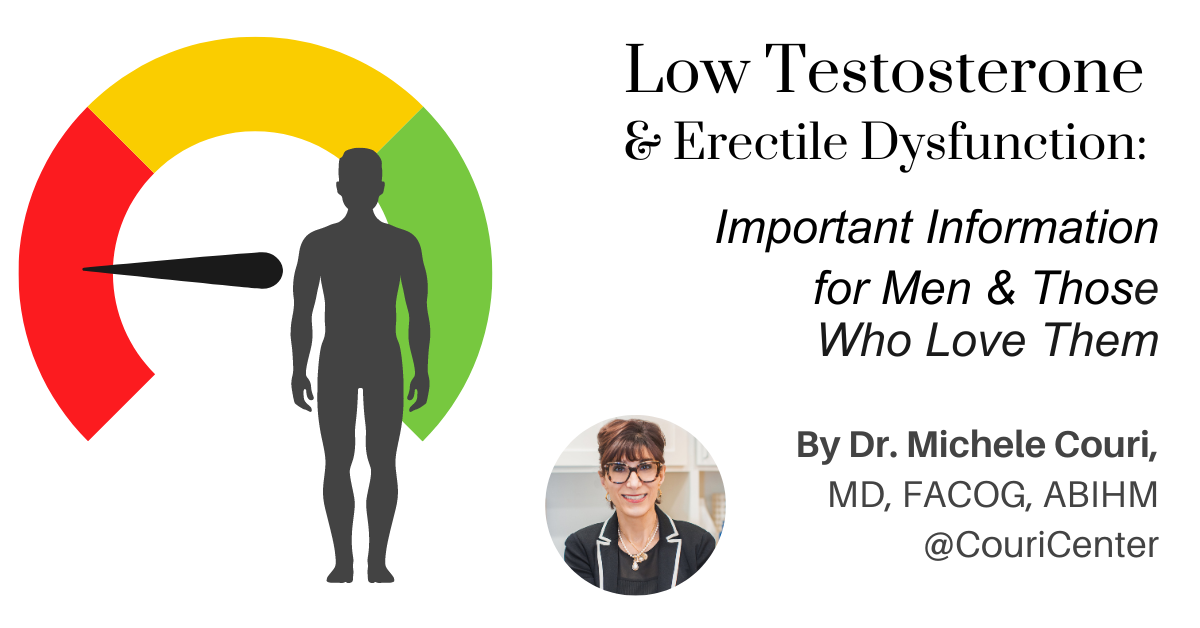
Summary
Delve into the intricate link between erectile dysfunction, cardiovascular health, and testosterone levels in Dr. Couri's enlightening blog post. Uncover the pivotal role of optimal testosterone levels in enhancing men's vitality and overall well-being with tailored solutions available at the Couri Center for Gynecology and Integrative Women’s Health. Explore actionable insights to address ED and prioritize men's health through comprehensive evaluation and management strategies.
Important Information for Men & Those Who Love Them
Loving Through ED: Partnering for Better Health & Intimacy
Women may have several reasons to care about their partner’s erectile dysfunction (ED). Firstly, it can impact their intimate relationship and overall satisfaction. Intimacy is an important aspect of many relationships, and ED can create barriers to physical closeness and emotional connection. Secondly, ED might indicate underlying health issues such as cardiovascular problems, diabetes, or psychological factors like stress or depression. Encouraging a partner to seek medical advice could lead to early detection and treatment of these conditions, improving their overall health and well-being. Lastly, supporting a partner through ED can strengthen the bond between them, fostering communication, empathy, and understanding. Ultimately, addressing ED together as a couple can lead to a healthier and more fulfilling relationship.
The Heart of the Matter: ED’s Impact Beyond the Bedroom
Erectile dysfunction is not just about sexual health; it is tightly linked to cardiovascular health and may be the first clue to bigger issues. Men with low testosterone are 38% more likely to die of a cardiovascular event like a heart attack or stroke. In a 2008 study, men whose total testosterone levels were in the lowest quartile (<241 ng/dl) were 40% more likely to die than those with higher levels, independent of age, adiposity, and lifestyle. Erectile dysfunction can be a sign of poor metabolic or cardiovascular health as ED depends on the health of the endothelium, the lining of the blood vessels of not only the heart but also the penis. Poor endothelial health can be caused by the standard American diet (SAD), smoking, insulin resistance, elevated blood sugar, HTN, toxins, and inflammation, just to name a few.
Beyond the Bedroom, Understanding the Underlying Causes of ED
ED is a major public health issue, affecting roughly 30 million American men. 52% of 40-70 year old men have ED, while 25% of men under age 40 suffer from it. There are a variety of causes of ED, and one critical and treatable cause may be suboptimal testosterone levels. It has been shown that 30% of men aged 40-79 experience low testosterone. Low testosterone can be made worse by obesity, insulin resistance, diabetes, and hypertension, which we commonly see in our country and worldwide. Obesity and ED can be directly correlated. The optimal body mass index for men ranges between 18.5 and 25kg/㎡. For men with a BMI between 25 and 30, there is a 1.5 times risk of ED, and that risk increases to 3x when the BMI is >30. The statistics for diabetes can also be staggering. 30% of Americans have prediabetes, and 40 million Americans have type 2 diabetes. 93% of Americans have “poor metabolic health,” so it is not surprising that we are seeing increasing numbers of men with low or suboptimal testosterone.
The Role of Testosterone in Men’s Sexual Health & Beyond
Optimal testosterone is not only crucial for sexual performance, it is also essential for sex drive (libido), mood, motivation, energy, optimal cognition, improved recovery from exercise or an injury, improved insulin sensitivity, and helps to build lean muscle mass. Maintaining an optimal testosterone level is vital for quality of life. Certain lifestyle factors can negatively affect a man’s testosterone level and include a diet rich in sugar, starch, and processed foods, an unhealthy gut microbiome, lack of exercise, environmental chemicals and endocrine disrupting chemicals (“forever chemicals”), toxins, heavy metals, and leptin resistance. The average American diet is composed of 65% ultra-processed food, and the average American in one year consumes 133 pounds of flour and 153 pounds of sugar (22 teaspoons of sugar/day). All of these unhealthy lifestyle components can play a role in suboptimal testosterone production and also in ED.
Low Testosterone and Erectile Dysfunction at Couri Center
Maintaining optimal testosterone levels is crucial for overall health and well-being, impacting various aspects of physical, mental, and sexual health. If you or your loved one suspects they have low testosterone levels; they should consult one of our healthcare professionals at the Couri Center for proper evaluation and management. We have comprehensive solutions, including testosterone pellet therapy and lifestyle programs designed to address the problem at the root cause in a personalized and professional manner.
To Your Health,
Dr. Couri
DISCLAIMER: THE INFORMATION PROVIDED ON THIS WEBSITE IS INTENDED FOR GENERAL INFORMATIONAL PURPOSES ONLY AND IS NOT INTENDED TO BE A SUBSTITUTE FOR PROFESSIONAL MEDICAL ADVICE, DIAGNOSIS, OR TREATMENT. THE INFORMATION PROVIDED IS CURRENT AS OF THE DATE OF PUBLICATION OR LAST REVIEW, BUT MEDICAL KNOWLEDGE IS CONSTANTLY EVOLVING, AND THE INFORMATION MAY BECOME OUTDATED OVER TIME.
Sources Used:
The Science of Erectile Dysfunction and Unexpected Ways to Treat It. Dr. Mary Hyman. The Doctor’s Farmacy. Episode 863.
Traish, A., et al. Testosterone Deficiency. The American Journal of Medicine. July, 2011. Volume 124, Issue 7, P578-587.
Laughlin, G., et al. Low Serum Testosterone and Mortality in Older Men. Journal of Clinical Endocrinol Metab. 2008. Jan;93(1):68-75.
